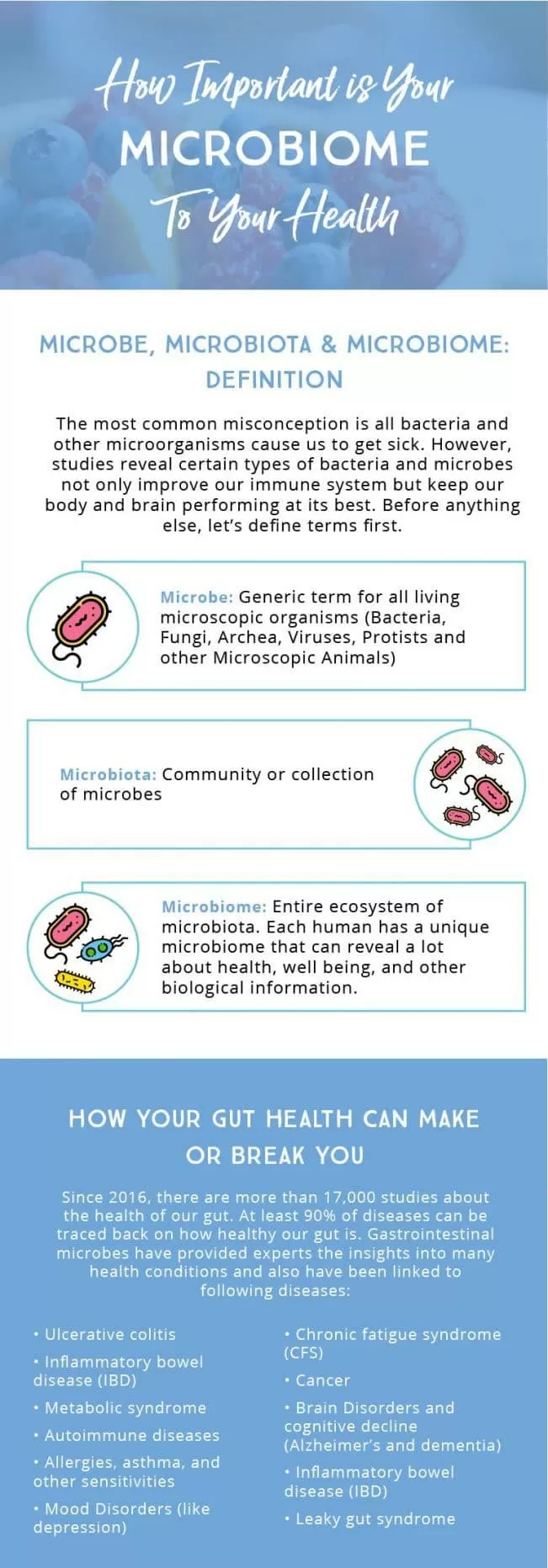Secrets to Human Microbiome: Working with Your Internal and External Microbes for Overall Wellbeing in Schaumburg IL

Right at this very moment, there are literally trillions of microorganisms living on and inside your body. The good news is, that not all of them would harm your health. Schaumburg IL chiropractors know that some are even essential to your overall wellbeing. Quite a revelation, right? If this shocked you, you would love to learn more from this blog post! Welcome to the secret world of the human microbiome.
The most common misconception is all bacteria and other microorganisms cause us to get sick. As science progresses, more studies reveal how certain types of bacteria and other microbes help us not only to improve our immune system but also ensure that our body and brain perform at its best. It has also been established that there are ways to make it sure that we "breed" the right microbes inside our body. Before anything else, let's define terms first.
Definition In Schaumburg IL: Microbes, Microbiota, and Microbiome
Microbe is a generic term for all living microscopic organisms (1). This applies to Bacteria, Fungi, Archea, Viruses, Protists and other Microscopic Animals. Microbiota, on the other hand, is a community or collection of microbes. Microbiome is the entire ecosystem of multiple microbiota. (2) Each human being hosts a unique microbiome that can reveal a lot about his health, well being, and other biological information.
Understanding the Dynamics of Human Microbiome
The human microbiome is a fascinating microscopic jungle. The microbes that we host don't exclusively live inside us. They're also on and around us. There's actually a layer of microbes around our body and each of us gives off unique sets and amounts of microbes to our surroundings. (3) In the future, experts say that our unique microbiome can be used for practical purposes such as identifying people involved in a crime scene by identifying their Microbiome "footprints". (4)
Understanding the different microbes in one's microbiome can reveal a lot of information about a person. It's considered our "genetic footprint". By identifying the microbes in our body, experts can find out our vulnerabilities to certain diseases, hereditary disposition, body type, and other bio profiles. Since each organ houses different microbiota, experts can now determine how a specific organ performs by just studying the communities of microbes in it. For example, our gut can reveal different information about our diseases, mental function, and behavior.
The good news is we can influence how our microbiome affects our overall well-being by managing our diet, stress, and lifestyle. We can nourish and breed the "good bugs" in our microbiome in our favor. The more experts find out the unique microbes in a person's body, the better they understand how he would react to different stimuli. (5)
To put things into perspective here's the human microbiome by the numbers:
- We emit 10 microbes per hour (6)
- We have at least 10-100 trillion microbes in our body. The majority can be found in out guts. (7)
- 10:1 is the ratio of human microbes to our human cells. (8)
- There is about four pounds of biomass inside our gut and more than three million typed of microbes in it. (9)
- The gut of an average human being has at least 160 bacterial species. There are at least 1,000 known bacteria in human digestive gastrointestinal tract.(10)
- The average human body has 30-40 trillion cells. The human microbiome at least doubles that number. (11)
90% of our diseases can be traced back to the microbes inside our gut. - Human cells are 99.9% identical to one another. 80-90% of each person's microbiome is different from another.
- By the time you're three years old, your entire human Microbiome is expected to be stable. (12)
- As scientist find out more about our microbiome, more and more figures will articulate what this wild jungle really looks like.
How Your Gut Health Can Make or Break You
Since 2016, there are more than 17,000 studies about the health of our gut. (13) It's been getting more attention compared to other organs in our body for a reason. At least 90% of diseases known to man can be traced back to how healthy our gut is. Gastrointestinal microbes have provided experts the insights into many health conditions and also have been linked to the following diseases:
- Ulcerative colitis
- Inflammatory bowel disease (IBD)
- Metabolic syndrome
- Autoimmune diseases
- Leaky gut syndrome
- Chronic fatigue syndrome (CFS)
- Cancer
- Brain Disorders and cognitive decline (Alzheimer's and dementia)
- Cancer
- Mood Disorders (like depression)
- Allergies, asthma, and other sensitivities
There are many beneficial microbes inside our gut that fight potential invasion of other bad bacteria. According to Dr. Rodney Berg of Louisiana State University in his study, the gut microbiota influences how our immune system responds to pathogens that harm our health. (14) Generally, babies who received breast milk have stronger immune system than those who just consumed formula milk. Breast milk contains a high amount of microbes with anti-inflammatory properties that has lifelong effects on one's immunity. (15)
The gut microbes also help us in digesting our food and even production of hormones, essential amino acids, and vitamins. (16) So if you want your body to have an efficient way to consume food and stable mental health, keeping the gut healthy should be one of your priorities. It's a matter of how we "cultivate" these good microbes (probiotics) to our advantage.
The gut microbes are now also directly linked to fertility, brain development, and even longevity.

Hacking Your Gut Microbiota with Probiotic-friendly Diet
Now that we understand the role of our gut in our overall wellbeing, it's about time to learn how we can help it help us leverage its mechanisms that support good bacteria. One of the ways to ensure we're helping the good microbes is through our diet.
By keeping a probiotic-friendly diet, we help our gut to perform the functions that it should be doing to keep us healthy. Diet with high fat, refined sugar, and low fiber is thought to weaken the gut's microbial diversity. (17) Some of the most highly recommended probiotic foods are the following:
- Yogurt - This is fermented milk with probiotics like bifidobacteria (18) and lactic acid bacteria. Yogurt helps people with hypertension (19). Choose the ones with live bacteria. If you have lactose intolerance, this is not for you.
- Kefir - This is another fermented milk drink made from cow's or goat's milk mixed with Kefir grains. Science says that Kefir is a better version of yogurt because even people with lactose intolerance can consume this beverage without having a problem. There are also studies that conclude it can strengthen our bones (20), improve digestion (21), and protect us from infection (22)
- Sauerkraut - It's finely cut fermented cabbage in an airtight container. Make it sure that you choose the unpasteurized Sauerkraut. It's rich in antioxidants like lutein and zeaxanthin (23)
- Tempeh - It's fermented soybean which is high in protein. The fermentation process enhances the amount of vitamin B12 in it. (24)
- Kimchi - It's a Korean side dish that is similar to Sauerkraut but it's spicy and mainly made from fermented cabbage added with other spices and seasonings. It contains lactic acid bacteria that helps our digestive system (25)
- Miso - It's a popular Japanese seasoning made from fermented soybean paste. Good source of fiber, several vitamins, phytonutrients and minerals including vitamin K, copper and manganese. There's a study that says it helps to lower the risk of breast cancer among Japanese women. (26)
Another type of food that you should have in your diet is anti-oxidant food. Top foods with high level of anti-oxidants are the following:
- Goji berries,
- Wild blueberries
- Dark chocolate
- Pecans, Artichoke
- Elderberries
- Kidney beans
- Cranberries
- Blackberries
- Cilantro
Whenever possible, you should also include the following herbs with high level anti-oxidant to your diet:
- Clove
- Cinnamon
- Oregano
- Turmeric
- Cumin
- Parsley (dried)
- Basil
- Ginger
- Thyme
This is not a complete list. There are other foods that you should include in your diet. Needless to say, fresh vegetables should always be included in your diet.
Lifestyle Improvement to Culture the Right Bacteria
Aside from proper diet, there are lifestyle adjustments that you should make to accommodate the good microbes of your body. One of these is managing stress. Stress preoccupies your body by keeping you in a fight or flight mode. In this state of your body, your immune system diverts its energy to focus on the "danger" caused by stress. It's not actively fighting infections. When you're susceptible to infection you're more likely to develop high-level inflammation. Stress triggers the production of compounds called cytokines that worsen your body's inflammatory response. This might lead to damaging your healthy cells.
The good news is, stress can be easily managed by exercising. It's a natural stress reliever. You can never go wrong with exercising. There are also studies supporting the role of exercise in improving your gut microbiota especially endurance type exercise. (27)
Another important change that you have to make is the use of antibiotics. This may not be a significant lifestyle change but it is a growing concern for the medical world. There are microbes that become immune to antibiotics over time. (28) Antibiotics are lifesavers but it has to be reserved for severe cases of infections. There are alternatives that your doctors can prescribe instead of using antibiotics all the time. There may be uncalculated risks that may arise from excessive use.
Summaries
- The human microbiome is a complex jungle of microscopic organisms that live with our body. There are organisms that help our body function better and there are also some that may cause detriments to our overall wellbeing.
- Largest microbiota is in our guts. The gut is our second brain because of the influence that it can do on our overall bodily function with the help microbes living there.
- Gut health can make or break your health.
- You can improve your gut health by being mindful of your diet, lifestyle, stress level, and minimal use of antibiotics.
If you're ready to get help with your health, contact us at the BrightLife Schaumburg today to schedule an appointment.

OFFICE HOURS
Monday
9:00am - 6:00pm
Tuesday
9:00am - 6:00pm
Wednesday
9:00am - 6:00pm
Thursday
9:00am - 6:00pm
Friday
9:00am - 6:00pm
Saturday
8:00am - 12:00pm
Sunday
Closed
BrightLife Schaumburg
44 W Schaumburg Rd
Schaumburg, IL 60194




